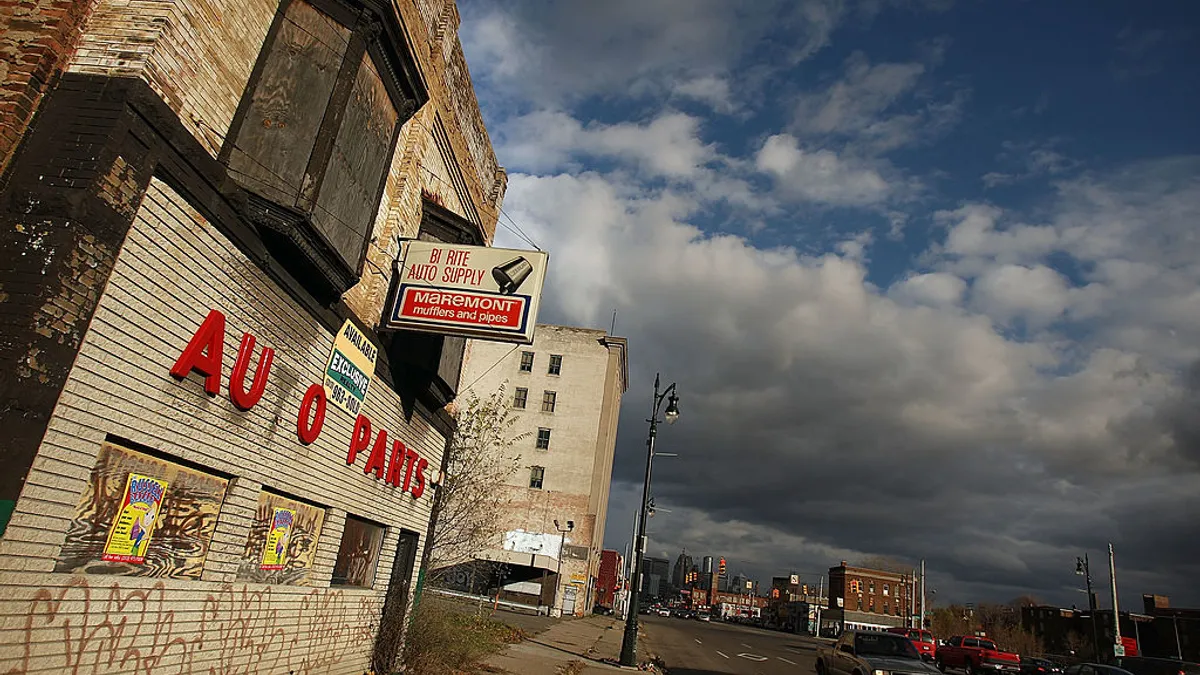Dive Brief:
- The National League of Cities (NLC) and the Center for Community Progress selected 12 cities across four states to participate in the Vacant Property Leadership Institute (VPLI) training program. The four-day program in February 2022 will equip leaders with skills and tools to address vacant, abandoned and deteriorated properties to benefit their communities at the local and state levels.
- The program heavily focuses on sustainable and equitable development strategies to improve vacant properties and return the land to valuable use. "We were looking for cities who understood why equity is important to be embedded in their vacant property strategy. As we were looking through the applications we wanted to see how each of the cities, towns and villages were trying to incorporate racial equity, and at the institute how could we augment that to help them get to the root cause of their issues," said Lauren Lowery, NLC housing and community development program director.
- The communities selected run the gamut from rural to urban, with populations ranging from 14,000 to more than 2.7 million residents. Participating Georgia cities are College Park, Perry and South Fulton; cities in Illinois are Chicago, Decatur, Kankakee, Peoria and Rockford; those in Kentucky are Louisville and Winchester; and cities in Wisconsin are Milwaukee and Racine.
Dive Insight:
The intensive VPLI program provides five participants from each city with in-person learning and networking opportunities related to blighted properties — residential, commercial and industrial —and how best to transform and maintain them.
"In order to address that, we must address the systems that are all interacting with each other and causing the appearance of the property," said Justin Godard, senior program officer for national leadership and education at the Center for Community Progress. "Vacant property is an issue, but it is also symptomatic of many other issues."
Property vacancies occur for a variety of reasons, one of which is economic hardship. The numbers of vacant properties jumped after the economic crisis starting in 2008, and they are expected to increase again due to the COVID-19 pandemic, Godard said. This is especially expected for commercial properties considering the number of restaurants, stores and offices that closed or fell behind on upkeep.
"Once a property gets behind on maintenance, it's very hard to catch up. We're concerned we may see more foreclosures and vacancies coming down the pipe with these conditions," Godard said.
Although VPLI does not provide participants with monetary support for their communities — only training — their costs to attend are covered. Besides the in-person training and networking with other cities' leaders, the cities receive up to 100 hours of technical support immediately after the four-day session to implement what they learned. The program also helps participants identify local stakeholders who play a role in collaboratively resolving the vacant property issue.
"The program provides support by helping cities work across local silos to build the relationships necessary to pursue a systems-based approach," Godard said.
For decades, cities have tried different strategies with varying degrees of success to revitalize vacant properties and blighted neighborhoods. Chicago and Baltimore each hosted $1 property sale programs in areas with significant blight. Baltimore also unveiled a controversial $700 million plan five years ago to demolish thousands of abandoned buildings and promote new development. And an urban farming nonprofit helped transform a blighted area of Detroit into an agrihood that established land for urban gardening while promoting rehabilitation for surrounding residences.
While Perry, Georgia, doesn't necessarily have a high amount of blight, the city aims to be proactive in its approach to addressing the pockets that do exist, said Holly Wharton, community planner at the city of Perry. "We pride ourselves on having a high quality of life, and one component of that is having clean neighborhoods and safe neighborhoods," she said.
Wharton says the three Georgia communities participating in VPLI intend to form a statewide delegation that will become a resource for other Georgia communities facing the same issues. They will distribute the knowledge they gain statewide to help other communities apply the new tools and techniques. Perry will provide a rural perspective while the other two cities — located near Atlanta — will provide an urban perspective.
"We want to be able to bring back information about how to strategically apply our new [resources] and hopefully make the work we do more efficient and effective," Wharton said.
VPLI stresses equity because although vacant or blighted property occurs in communities of all sizes across the country, the majority are found in low-income communities or communities of color.
"We know that the neighborhoods most affected by these issues are typically lower income, minority-heavy neighborhoods. We want to make sure we're learning the skills we need to apply equity to all our processes and work with residents in those neighborhoods to make sure our goals are achieved in the most fair and equitable manner possible," Wharton said.












